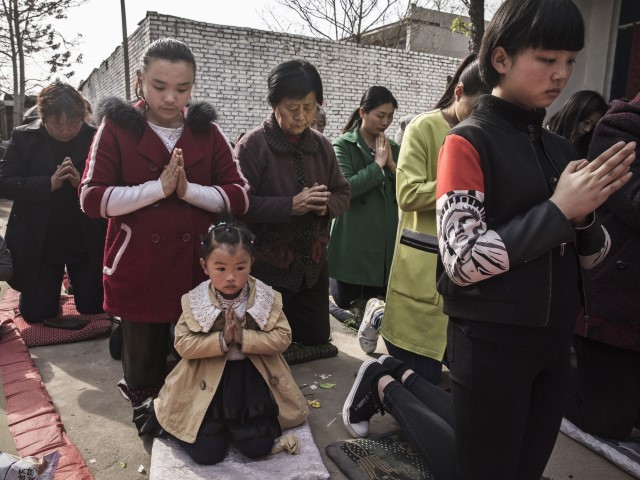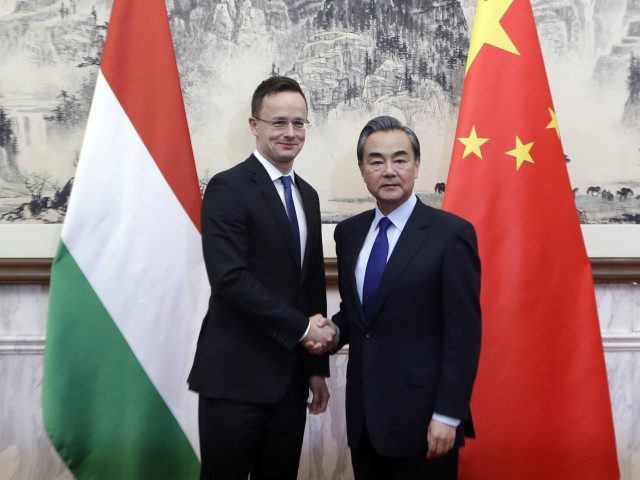Chinese Foreign Minister Wang Yi enthusiastically celebrated Hungarian Prime Minister Viktor Orbán’s landslide victory this weekend in a call to his counterpart in the country, Foreign Affairs Minister Peter Szijjarto, and vowed China would “staunchly support” Orbán in Hungary’s “development path.”
Orbán’s Fidesz Party, which identifies as nationalist and conservative, won a decisive victory on Sunday, securing about 53 percent of the vote agianst the opposition United for Hungary Party. Orbán celebrated the win as “so big that you can see it from the moon” and claimed it as a defeat for the “international left” shortly before the world’s largest Communist Party extended its praise and support to Fidesz. The win will grant Orbán a fifth term, four of them consecutive, as prime minister.

Hungary’s Prime Minister Viktor Orban acknowledges cheering supporters during an election night rally in Budapest, Hungary, Sunday, April 3, 2022. (Petr David Josek/AP)
Chinese officials typically reach out to congratulate leaders of friendly nations following a significant electoral win despite the absence of any popular participation in governance in China. China and Hungary have greatly expanded ties under Orbán, the first European leader to join China’s Belt and Road Initiative (BRI), a global infrastructure program whose core service is offering predatory loans to developing nations.
Wang reportedly told Orbán’s top diplomat in a phone call on Tuesday that China would seek to “continue to enhance bilateral cooperation in various fields to build a stronger comprehensive strategic partnership,” according to the Chinese regime news outlet Xinhua.
“Wang conveyed congratulations of the Chinese leaders over the Fidesz party’s re-winning parliamentary elections under the leadership of Hungarian Prime Minister Viktor Orban,” Xinhua relayed. “The election result shows that the independent policy pursued by the Hungarian side is in line with the country’s national conditions and the common interests of its people, and is firmly and broadly supported by the people, Wang said.”
Wang reportedly “wished that the Hungarian side will achieve greater progress under the leadership of Prime Minister Orban” and “said China will continue to staunchly support Hungary in preserving its independent choice of development path.”
Xinhua described the conversation as warm, noting that Szijjarto expressed appreciation for “the mutual trust and friendship between Hungary and China and the high level of their ties.”
“Hungary will continue to firmly safeguard its legitimate interests, and is ready to deepen cooperation with China in various fields and promote their comprehensive strategic partnership to higher levels, Szijjarto said,” the state outlet claimed.
The Chinese Communist Party’s embrace of the victory follows Orbán himself declaring in his victory speech on Sunday that he had defeated “the left at home [and] the international left all around” to stay in power. Orbán has previously declared it a “calling” of former communist states in Europe to ensure that Western values prevail over authoritarianism.
“In this situation in Europe, we Hungarians can clearly see the essence of our European calling,” Orbán said in remarks last year. “It is to bring the uncompromising anti-communist tradition into the common store of European values. It is to place the crimes and lessons of international socialism alongside the crimes and lessons of national socialism.”
Orbán’s government has also prioritized opposition to Christian persecution and the embrace of Christian values around the world.
“Unfortunately, Christianity is still the most persecuted religion on earth and we should not forget about that, not even under these challenging circumstances we are experiencing now,” Szijjártó, the foreign minister, said at an online conference in 2020.
China is the world’s largest and wealthiest communist country and extends both financial and political support to every other communist country on earth and most socialist states. Chinese dictator Xi Jinping has branded his personal interpretation of communism as “Xi Jinping Thought on Socialism with Chinese Characteristics for a New Era” and Chinese state propaganda outlets and Chinese diplomats regularly tout the superiority of “socialism with Chinese characteristics” as a political system over Western-style free society. Xi has called socialism “the essence of patriotism.”
China is also one of the world’s most ardent repressors of Christianity. China is believed to be home to 100 million Christians – compared to about 7.8 million in Hungary – who face arrest and disappearance for participating in “house churches” instead of going to Communist Party-led services. Chinese authorities have regularly bulldozed churches and, on occasion, bulldozed the Christians in them. The Chinese Communist Party has explicitly decreed, “Christianity does not belong in China.”

Chinese Catholic worshippers kneel and pray during Palm Sunday Mass during the Easter Holy Week at an “underground” or “unofficial” church on April 9, 2017 near Shijiazhuang, Hebei Province, China. China, an officially atheist country, places a number of restrictions on Christians, allowing legal practice of the faith only at state-approved churches. The policy has driven an increasing number of Christians and Christian converts ‘underground’ to secret congregations in private homes and other venues. (Kevin Frayer/Getty Images)
Hungary under Orbán has done little to confront China about its persecution of Christians or global promotion of communism. Orbán himself has expressed resignation at the fact that China will inevitably become a global leader surpassing America.
“America is in decline, while China is getting stronger. Hungary, with 10 million, has to manoeuvre skilfully in such a period,” Orbán shrugged in an interview this year. “We are in an alliance with the West, but we also want to build an advantageous relationship with the emerging new superpower.”
While remaining prodigiously popular at home, Orbán’s relationship to China caused significant controversy last year after plans emerged to bring a campus of Fudan University, a Communist Party institution in Shanghai, to the capital. A crowd of an estimated 10,000 people protested the planned construction of the campus last June – both due to ideological concerns and due to reports that the Hungarian taxpayer would be footing the nearly $2-billion bill. Budapest residents voted to organize a referendum on the Fudan University project last month.
Follow Frances Martel on Facebook and Twitter.

COMMENTS
Please let us know if you're having issues with commenting.